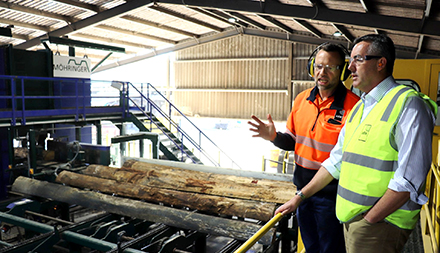The Federal and State governments must act urgently to provide certainty for Australia’s hardwood timber industries and stop the lawfare being waged by activist groups, according to the Australian Forest Products Association. Source: Timberbiz
AFPA CEO Ross Hampton said reports that Victorian sawmills could run out of timber within two years, due to ongoing litigation that has stalled planned timber harvesting operations, were alarming and should prompt the Victorian and Federal Governments to take immediate action.
Mr Hampton urged the Federal and State Governments to address the uncertainty around Regional Forest Agreements (RFAs) created by a Federal Court decision earlier this year, which has emboldened activist groups to launch more legal claims against state government-managed timber harvesting operations.
“AFPA cautiously welcomed the Victorian Government’s announcement in July that it would review the Code of Practice for Timber Production to ‘minimise the risk to short-term supply obligations arising from third-party litigation’, but we are concerned by the reports that the review is taking too long and is not addressing its main objective,” Mr Hampton said.
“Recent legal action has already significantly impacted on timber harvesting plans in Victoria and Tasmania and could spread to the other states with Regional Forest Agreements, NSW and Western Australia, unless governments clarify the legal uncertainty that activist groups are seeking to exploit.”
Mr Hampton said the lawfare is putting tens of thousands of jobs across Australia that rely on the native timber industry at risk, at a time when the country can least afford such a disastrous collapse of a major industry.
“What’s worse is that these attacks on workers are all predicated on the untruth that Australia’s native timber industry is not sustainable. The facts are that native forestry operations occur on only a tiny fraction of Australia’s native forest estate, using the equivalent of just 6 trees out of every 10,000 annually, and every tree is replaced as the areas are regenerated and regrown by law.
“RFAs have been in place for over 20 years and are independently reviewed every five years, and those reviews have found they are meeting or exceeding all environmental objectives,” Mr Hampton said.






